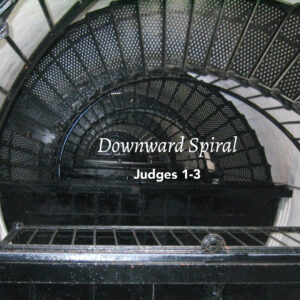Judges 1-3: Downward Spiral
April 12, 2024
TODAY'S BIBLE READING:
Judges 1-3, Psalm 82, Mark 5:1-20, 1 Corinthians 9:1-12

The Book of Judges is one of the most rewarding, as well as most surprising, studies in the Old Testament. It has a clear overall message and structure: God’s people—once the generation that knew Joshua had died out—failed to keep God’s covenant (Josh. 24:31; Judges 2:10-13). They did not completely drive out the inhabitants of the nations (1:19, 21, 27-36) and began to “whore” after the baals, the false gods (2:11-13, 17; 3:6-7). As a result, God gave them over to misery, enslavement (3:8, 12-14). They were being tested to see if they would “learn war” (2:20-3:4), that is, learn that their effectiveness and prosperity depended upon their fidelity to their covenant with God.
When they were in distress they would call upon the Lord, and, moved by pity, he would send a “judge” (3:9, 15), a specially anointed leader that God himself had raised up, perhaps in the archetype of the judges that Moses had appointed (Ex. 18:13-27). These judges were not primarily judicial figures, though; they were saviors, deliverers, and leaders. It is hard to say that they are types of Christ, for while in some sense they must be as they are designed to save God’s people—and Christ is the ultimate Savior of God’s people—in another sense they are very much leaders with feet of clay (Samson being the most infamous).
Throughout Judges, then, there is a longing, a longing that a true leader, a true king, would emerge. The people did as they saw fit for there was no king in those days (Judges 17:6; 21:25). That is the repeated refrain by the end of Judges, as the book points to the type of Christ, the King David who is to come, and through him to the One True King Jesus.
We see then a vicious spiral, from the heights of triumph (albeit imperfect) to increasing disaster, until finally a king is anointed, and then only when David is anointed is there some respite and a return to something like what was originally intended for Israel in this Promised Land. These three chapters introduce these themes over and over again, and also begin the cycle of rebellion against God, asking God for mercy, God sending a judge to save his people, and then rebellion again—Othniel (3:7-11), Ehud (3:12-30), and Shamgar (3:31).
Space does not allow an extensive discussion of each of these, but some word should be given to the Sunday School favorite Ehud. He was left-handed, though the narrator tells us carefully he was a Benjamite, meaning literally “son of my right hand” (3:15). It is a little indicator that God is using what he can find: the weak, those rejected by others.
Many a child has delighted in the details in verses 21 and 24, which remind us that the Bible is not above gory truth or exposing the idiocy of those who set themselves up against the God of the universe. Expansive empires can be pricked with one sharp sword, and the death throes of the deceased evil dictator becomes a jaunt for children.
All in all, then, we are called by this Book of Judges and these introductory chapters to put our faith in God, to serve him alone, to realize that effective Christian living comes from our obedience to his covenant, to cry out to God for mercy when we fail, and to put our trust in the True King Jesus as our One True Savior.
ABOUT THE AUTHOR
Josh Moody (Ph.D., University of Cambridge) is the senior pastor of College Church in Wheaton, IL., president and founder of God Centered Life Ministries, and author of several books including How the Bible Can Change Your Life and John 1-12 For You.
WANT MORE?
To receive God Centered Life devotionals directly in your inbox, as well as other resources, enter your email address in the form at the bottom of this page and click "subscribe."

